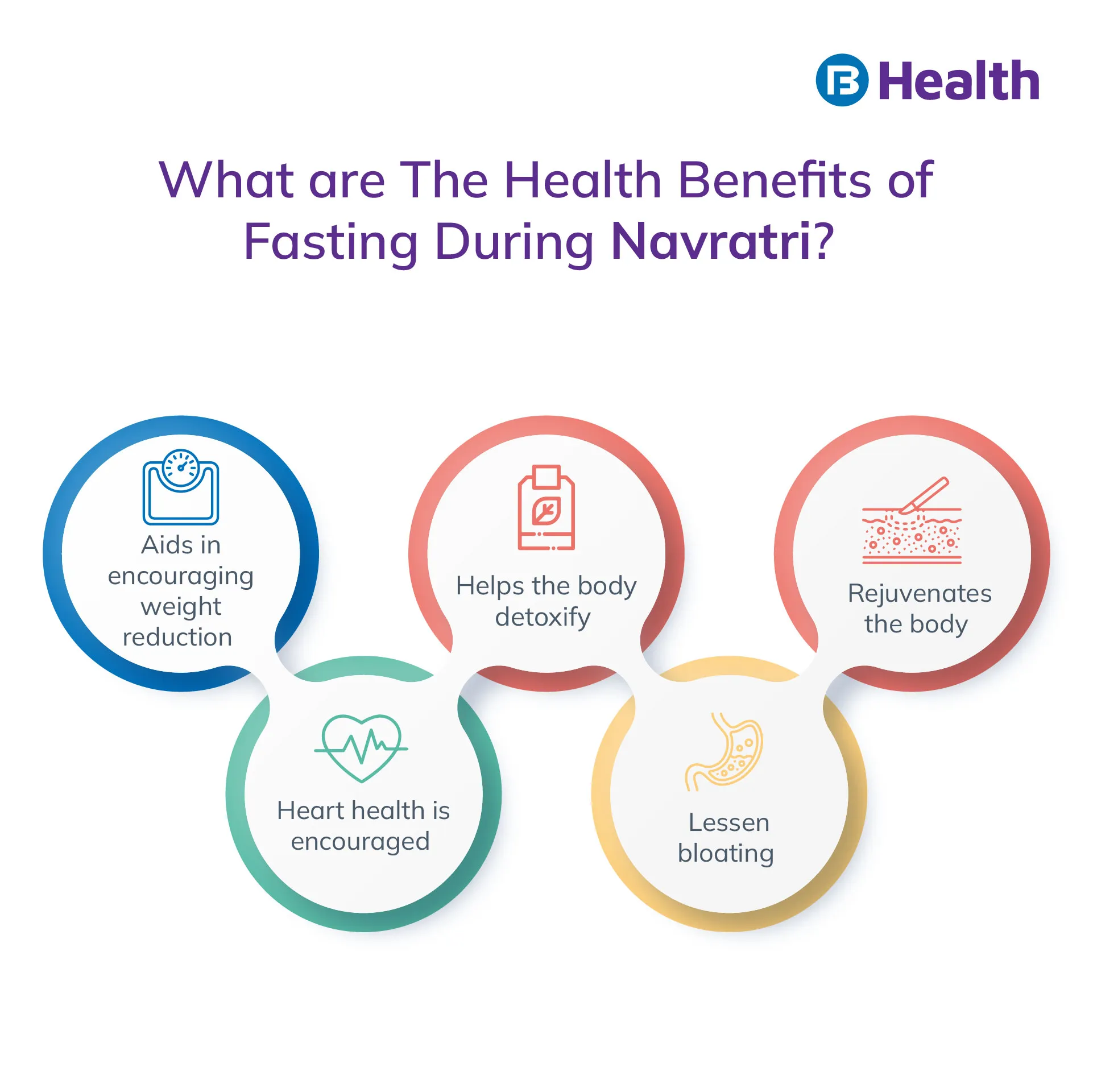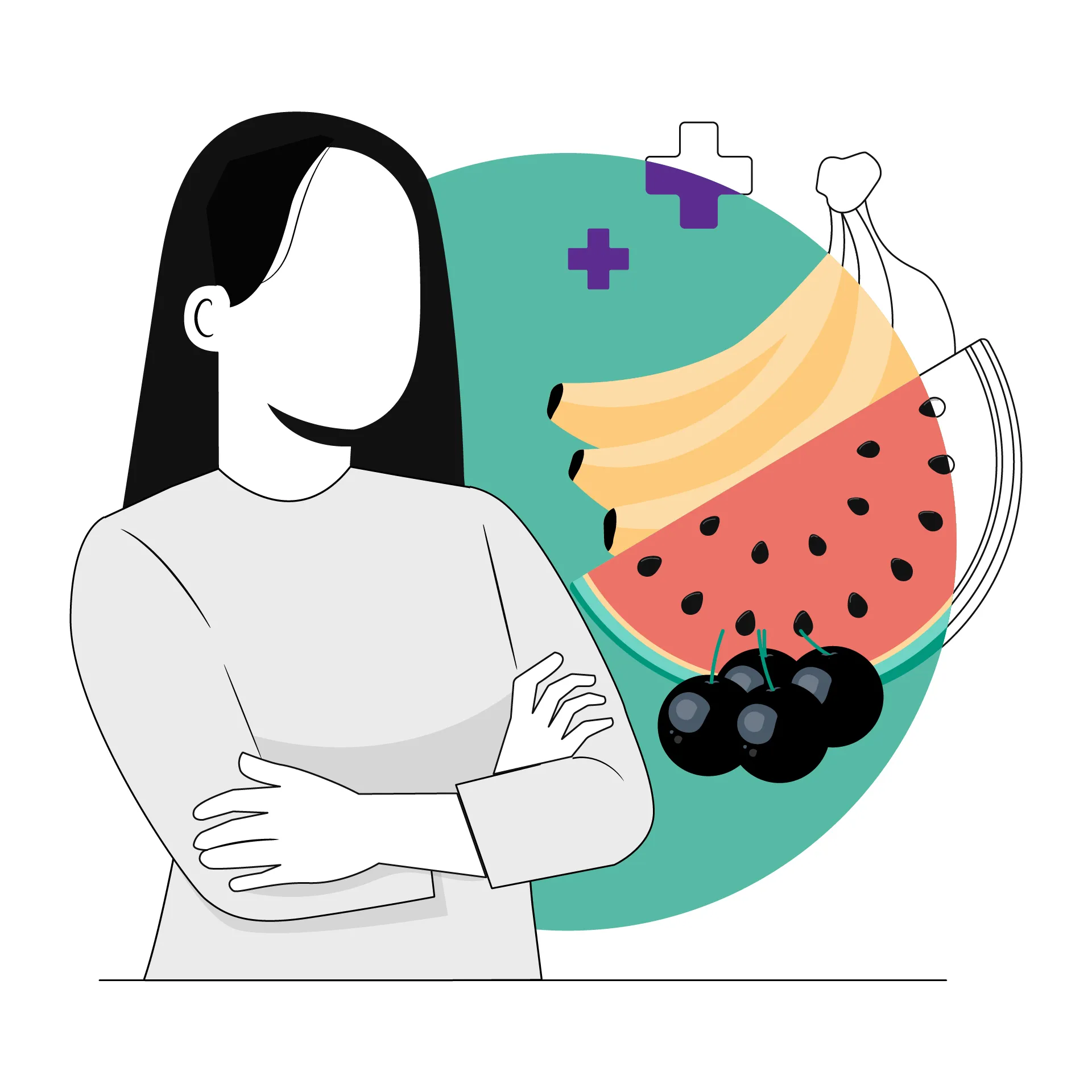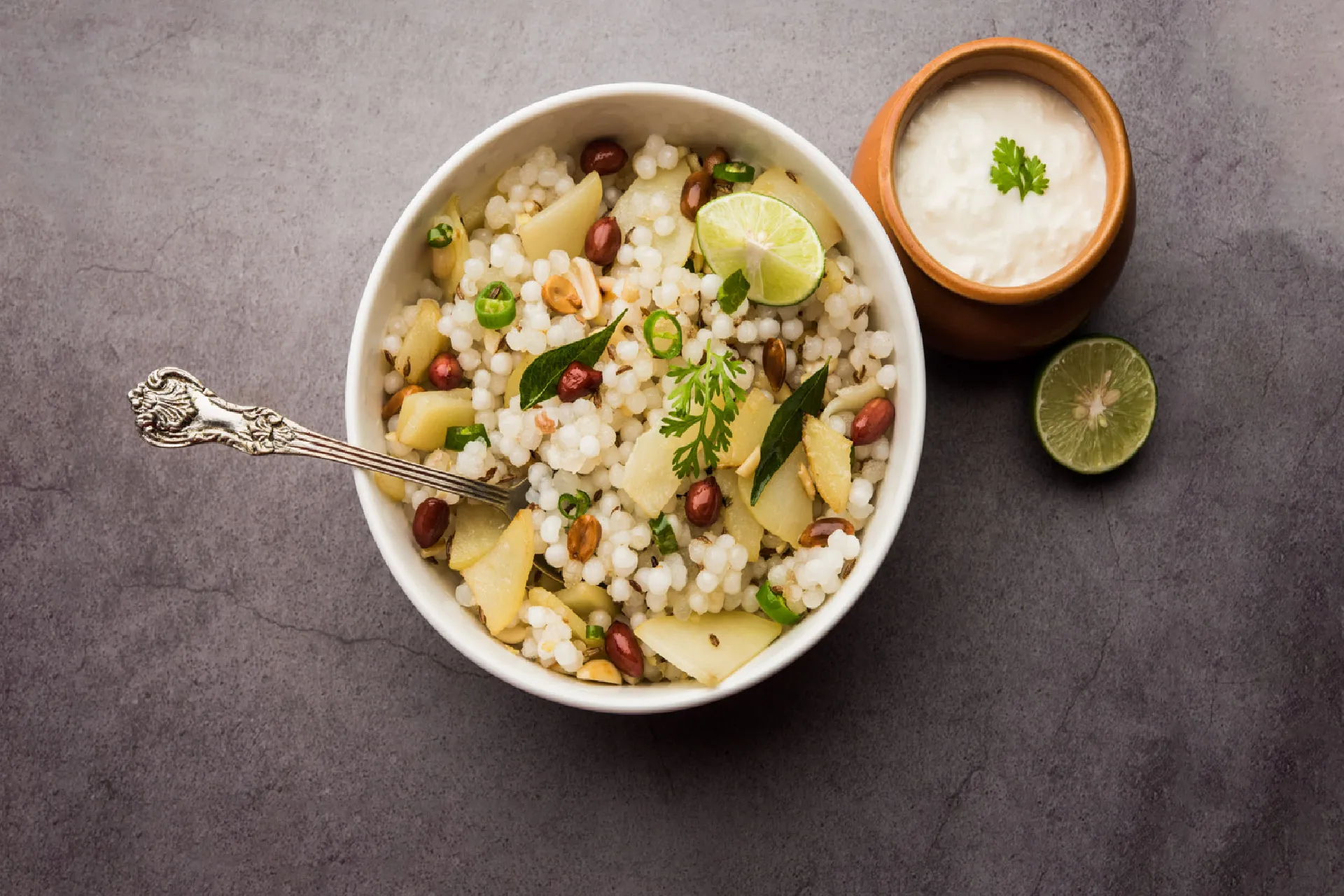Nutrition | 7 min read
Navratri Fasting Benefits, Guidelines and Precautions
Medically reviewed by
Table of Content
Synopsis
India celebrates Navratri with splendor and enthusiasm. Various delicacies, fast meals, and dandia evenings with friends and family are part of these events. With delicious cuisine, fasting rituals, and prayers for nine days, Navratri is the best time to revitalize and renew your mood.
Key Takeaways
- One of the main navratri fasting benefits include that it detoxifies the body
- Fasting during navratri helps in weight reduction and also improves
- Staying hydrated, eating light meals, and taking proper rest are some of the effective ways to enjoy navratri fasting
Despite the religious and cultural significance of fasting during Navratri, anyone with health difficulties must speak with their doctor before starting any diet. In Navratri, many individuals practice a nine-day fast out of devotion, but it's noteworthy to note that Navratri fasting has benefits as well. The benefits of Navratri fasting and the guidelines and precautions that need to be taken when doing Navratri fasting are described here. So, continue reading to learn about the Navratri fasting benefits.
Why Do People Fast During Navratri?
Navratri is a time to unwind, look inside, and refuel ourselves with new vitality. It is also a period that is rich in colors, traditions, songs, and dancing. During Navratri, fasting facilitates the inner path towards joy. It brings forth consciousness and delight and lessens mental agitation.
Fasting during Navratri, which heralds the start of a new season, is seen as lucky, and also, there are a lot of Navratri fasting benefits. It's also thought that individuals who fast for these nine days receive the blessings of Goddess Durga. We fast, however, not to appease the Divine but to purify our bodies, according to Gurudev Sri Sri Ravi Shankar [1]. Additionally, fasting detoxifies the body, and when the body is cleansed, prayers are deeper and more sincere.
Detoxifying your body is one of the benefits of fasting during Navratri. Avoid elaborate, unhealthy meals favoring sattvic foods like fruits and wholesome vegetables. The best choices are veggies that contain water, such as bottle gourd, pumpkin, cucumber, and spinach. Have papayas, bananas, or watermelons in the meantime. The diet will not only keep you full, but it will also assist in internal body cleaning.
Additional Read: Ways to Stick to Your Diwali Diet Plan
Health Benefits of Fasting During Navratri
The Navratri fast benefits are listed as follows:
Aids in encouraging weight reduction
- You must consume no gluten when fasting during Navratri. As a result, you may only include specific grains in your diets, such as sago, buckwheat, amaranth, and water chestnut flour.
- In addition to having more protein, fiber, and other essential elements, these grains are also easier on the digestive system. They aid in weight loss and keep you full for a long time.
- In addition, foods like fruits, green vegetables, wholesome spices, fresh fruit juices, and buttermilk can also help you keep a healthy weight.
- Experts claim that fasting also increases ketosis or 7 fat burning. As a result, during a fast, your body burns extra fat accumulated around your liver, kidneys, and other organs. Additionally, this enhances organ performance.
Heart health is encouraged
- Additionally, fasting lowers the risk of coronary heart disease and diabetes.
- Intermittent fasting reduces the risk of related illnesses while also improving blood cholesterol levels, according to studies.
- It reduces the likelihood of clogged arteries, heart attacks, and strokes by removing fat deposits from circulation. But you should also have appropriate medical insurance coverage in emergencies.
Helps the body detoxify
- You consume a lot of fiber-rich fruits, vegetables, and grains when you fast during Navratri.
- These nutrients support immune development, the removal of toxins from the body, and general health.
Reduces bloating
- In addition, the likelihood of experiencing bloating and digestive pain is reduced when you follow a healthy, gluten-free diet. Fasting during Navratri is especially advantageous for people who are gluten intolerant.

Navratri Guidelines For Healthy Fast
Stay hydrated
- The need to remain hydrated cannot be overstated. Have coconut water, lemonade, and buttermilk in addition to water.
- Even while many individuals do drink caffeine during Navratri, green tea often takes its place.
- Despite the fasting time and the oppressive heat, consuming nutritious beverages will maintain the health of your digestive system.
Eat sattvic cuisine
- Fasting during Navratri is one way to cleanse your body.
- Substitute sattvic foods like fruits and healthy greens with unhealthy dinners.
- Water-rich vegetables such as bottle gourd, pumpkin, cucumber, and spinach are among the finest choices.
- Meanwhile, snack on watermelons, bananas, or papayas. The diet will not only keep you full, but it will also help you cleanse your body from the inside out.
Consume tiny servings
- Overeating is a common error that individuals make during fasting. Avoid eating in between meals and avoid bingeing.
- Binge-eating can negatively impact your health and contribute to unwanted weight gain.
- Consume modest quantities throughout the day, such as fruits, nuts, and healthy drinks, to avoid overeating at dinner.
Make a food plan
- People frequently take their eating habits for granted because Navratri is a nine-day fasting celebration.
- Your physical health may suddenly alter as a result of that. Therefore, attempt to schedule your meals throughout the day rather than nibbling randomly.
- To make your supper healthy, include a variety of nutritional foods, including fruits, vegetables, legumes, and beans.
Pick foods low in fat
- Eating fried meals can cause you to gain weight quickly and will immediately raise your cholesterol.
- You can indulge in heavy food sometimes, but avoid foods heavy in fat and sugar.
- Try switching from full-fat milk to buttermilk and from fatty snacks to nutritious makhanas or fruit chaat.
Avoid going without food
- The idea that fasting means starvation is widespread but untrue. Many people tend to put off eating at the appropriate scheduled time, which ultimately worsens their health.
- Long periods without meals can cause weakness, anemia, weariness, and even migraines.
- As a result, continue eating small meals throughout the day to get things started. A few finger snacks, such as nuts, seeds, or fruits, can be kept on hand.
Obtain adequate rest
- Your routine may vary when you are fasting, which presents certain physical problems.
- It is advised that you get enough sleep every night to prevent health risks, one of which is that you could feel drowsy or lightheaded throughout the day.
- It is much more important to carve out at least 7-8 hours of sleep every day if your career requires strenuous physical labor.
Do Exercise
- Similar to every other day, fasting has its benefits for exercise. Navratri doesn't need you to skip a workout, so don't feel obligated to.
- You may always choose low-energy workouts that maintain your body's metabolism as an alternative to high-intensity training.
- Low-intensity exercises are also excellent for boosting your mood and improving blood circulation in your body.
Be Stress-Free
- One could overlook taking care of their mental health when fasting, food planning, and taking care of their physical health.
- Keeping an eye on your happiness is crucial since festivals are all about the positive.
- Even if you have a busy schedule, make time for relaxation and meditation daily to reduce stress.
Precautions to Take While Fasting
Observe your blood pressure
Monitor your blood pressure while fasting if you have hypertension or hypotension. Although fasting can assist people with hypertension decrease their blood pressure, speaking with a doctor before beginning a fast is advisable.
If you have diabetes, don't try to fast
In diabetics, fasting can result in a sharp drop in blood sugar levels, which can be highly dangerous. This is especially true for those who take insulin to control their blood sugar levels. Blood sugar levels are lowered by fasting, and the recommended medicine may further lower them. Hypoglycemia, a condition that causes you to feel jittery, uncertain, irritated, and dizzy, may result from this [2].
So, for diabetics, fasting is strictly prohibited. Also, make sure you have the appropriate medical insurance, particularly a plan designed specifically for diabetics.
Consult Your Doctor before fasting
If you have any medical issues or are under medication, you need to get a doctor's consultation before fasting.
Avoid trying an excessive fast
Extreme or prolonged fasting might result in weakness, exhaustion, vertigo, and headaches.
Additionally, it may significantly reduce blood sugar levels in diabetics. For this reason, avoid engaging in a strict fasting regimen during Navratri or any other time of the year.
Navratri Fasting Rules
Navratri fasting rules are the rules people follow during festival time. Garlic and onion must not be used to prepare any fast-related dish. Legumes, lentils, rice flour, maize flour, all-purpose flour, whole wheat flour, and semolina must all be avoided if you are fasting. Additionally, non-vegetarian meals, eggs, alcohol, smoking, and aerated beverages are strictly prohibited.
For some body types and medical circumstances, fasting is not advised. Therefore, it is wise to speak with a general physician before beginning a fast. Remember that you should only fast as much as you find comfortable.
Visit Bajaj Finserv Health to get personalized healthcare services for you and your family or to book an online doctor consultation from the comfort of your home. With Bajaj Finserv Health, you can choose the best physicians in your area, make appointments, set up reminders for taking your medications or getting shots, save all your medical information in one location, and more.
References
- https://wisdom.srisriravishankar.org/fasting-every-week/
- https://www.niddk.nih.gov/health-information/diabetes/overview/preventing-problems/low-blood-glucose-hypoglycemia
Disclaimer
Please note that this article is solely meant for informational purposes and Bajaj Finserv Health Limited (“BFHL”) does not shoulder any responsibility of the views/advice/information expressed/given by the writer/reviewer/originator. This article should not be considered as a substitute for any medical advice, diagnosis or treatment. Always consult with your trusted physician/qualified healthcare professional to evaluate your medical condition. The above article has been reviewed by a qualified doctor and BFHL is not responsible for any damages for any information or services provided by any third party.





